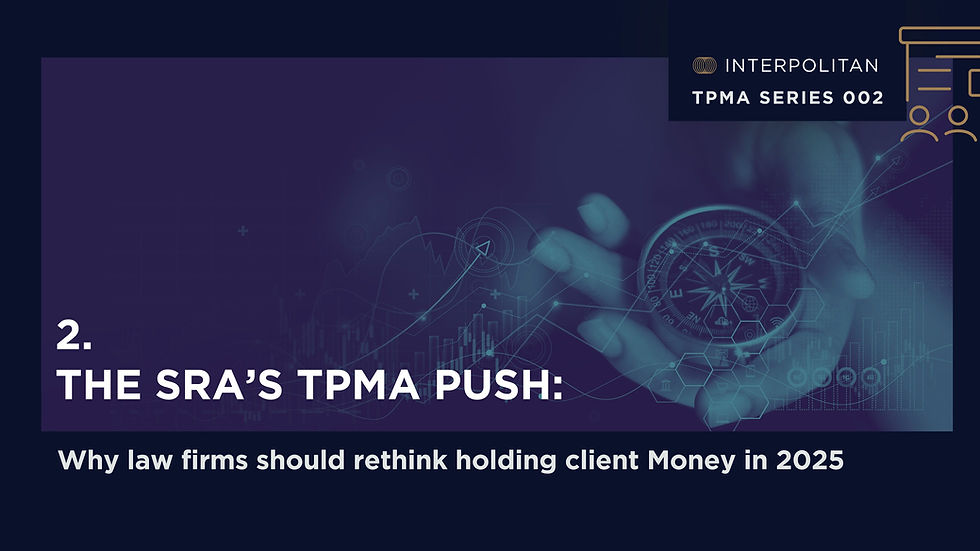Court-Approved: How TPMAs Are Supporting Conveyancing and Estate Transactions
- Jon East

- Aug 6, 2025
- 3 min read
Updated: Aug 7, 2025

Discover how TPMAs are being used in conveyancing, wills, and estate transactions and why UK courts increasingly support this approach.
 Written by Jon East |  Contributor Daniel Dunne | Latest edited Aug 2025 5 min read. |
Table of contents
Welcome to the fourth instalment of our mini five part series on Third Party Managed Account.
Introduction
From residential property sales to complex estate distributions, legal professionals routinely manage high-value client payments. But traditional client accounts are no longer the only solution and in many cases, no longer the safest.
Third Party Managed Accounts (TPMAs) are emerging as court-recognised, regulator-approved tools for securely handling funds in property, probate, and private client matters.
TPMA in Conveyancing: A Smarter, Safer Settlement Model#
Conveyancing remains one of the highest-risk areas of legal practice when it comes to managing client money. Firms regularly handle large sums deposits, mortgage redemptions, completion funds often under tight timelines. One delay, fraud attempt, or reconciliation error can derail an entire transaction.
In recent years, the sector has faced increasing challenges:
Cyber fraud targeting completions
Client account reconciliation failures
Law firm collapses due to mismanaged funds
Real-World Case Studies: Misappropriation & Risk in Legal Client Accounts - Charles Stevens / Bawtrees LLP
TPMAs in Conveyancing & Estates
£650,000 deposit misrepresented in property transaction
What happened: Charles Stevens, a solicitor at Bawtrees LLP, falsely claimed client funds had been received during a high-value conveyancing deal and attempted to prevent a fellow solicitor from reporting the breach.
Regulatory outcome: Stevens was struck off by the SDT for dishonest conduct and misleading colleagues during a property completion.
Relevance to TPMA: Highlights the risk of internal misrepresentation and the absence of third-party verification in solicitor-controlled accounts—gaps TPMAs close through dual-authorisation and full audit trails.
Source: Legal Futures
Developers, Not Just Law Firms
TPMAs also benefit property developers and construction companies, especially those operating across multiple jurisdictions.
They’re used to manage:
Drawdowns
Deposits and reservation fees
Subcontractor payments
When Henry Construction collapsed in 2023, millions in advance payments were lost. A TPMA framework might have protected those funds via ring-fenced segregation and real-time visibility.
TPMA for Wills, Estates & Trusts
Beyond property, TPMAs are gaining traction in probate, inheritance, and trust administration where the stakes are emotional, legal, and financial.
Key benefits include:
Transparent visibility for executors and beneficiaries
Segregated sub-accounts for multi-party estates
Controlled disbursement through regulated instructions
Reduced fraud and simplified oversight in sensitive cases
Legal Precedent & Practical Adoption
While courts don't formally mandate TPMAs, they increasingly support and encourage their use particularly in high-value, contested, or vulnerable estates.
TPMAs help:
Simplify legal representative oversight
Safeguard beneficiary interests
Reduce administrative disputes and financial risk
Key Benefits for Legal Professionals
Built-in transparency:
Real-time ledger access for clients, partners, and compliance officers
No trust account stress:
No float, no manual reconciliation, no client account exposure
Regulatory peace of mind:
SRA Rule 11–compliant, with FCA safeguarding and capital controls
Secure disbursement:
Dual-authorisation workflows, instant confirmations, audit trail
Cyber-resilience:
No direct client-to-solicitor transfers; risk is mitigated at the source
“In high-value estate cases, transparency and control are everything. TPMAs provide both.” — Private Client Partner, London
“We use TPMAs to ensure funds are never at risk — and our clients appreciate that clarity.” — Probate & Estates Solicitor, South East England
Ready to Protect Your Clients and Your Firm?
Interpolitan provides fully aligned FCA-regulated TPMA services for legal professionals across the UK and internationally. We help mitigate risk, simplify compliance, and future-proof your operations.
Next in our series:











Comments